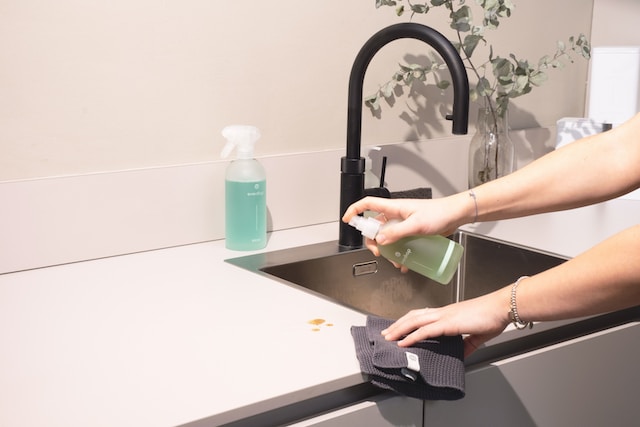 Cleaning Services
Cleaning Services
The kitchen is the heart of your home, where delicious meals are prepared and memories are made. To ensure a healthy and inviting cooking space, regular kitchen cleaning is essential. In this article, we'll provide you with a comprehensive set of kitchen cleaning tips to maintain a hygienic environment for you and your loved ones.
Before you dive into deep cleaning, clear your kitchen countertops of unnecessary items. Store appliances and utensils you don't use regularly to create a clean, open workspace.
Take everything out of your refrigerator, check for expired items, and wipe down the shelves and drawers with a mixture of water and baking soda. Be sure to clean the exterior, including handles.
Wipe down the exterior of your appliances, such as the microwave, oven, dishwasher, and toaster, using an appropriate cleaner. Pay attention to knobs and buttons, where dirt and grease tend to accumulate.
For a spotless stovetop, remove burner grates and knobs, and soak them in warm soapy water. Clean the stovetop surface with a degreaser or a mixture of vinegar and water. Don't forget to clean the vent hood and filter if you have one.
Use a mild abrasive cleaner or a paste made of baking soda and water to scrub your sink. Pay special attention to the drain and faucet handles. To disinfect, consider using a mixture of water and white vinegar.

Wipe down your countertops with a disinfecting spray or a solution of water and a few drops of dish soap. Be cautious with abrasive cleaners on delicate surfaces like marble or granite.
To remove food debris and prevent odors, clean your dishwasher's filter and run an empty cycle with a dishwasher cleaner. This will keep your dishes sparkling and your dishwasher smelling fresh.
Wipe down the exterior of your cabinets and drawers, paying attention to handles and knobs. Inside, organize your pots, pans, and utensils to maximize space and ease of use.
Sweep and mop the kitchen floor, giving extra attention to corners and baseboards. If you have tile grout, consider using a specialized grout cleaner to remove stains and discoloration.
To keep pests at bay, clean up food crumbs and spills promptly, store food in airtight containers, and seal any cracks or gaps where pests might enter.
Empty the trash and recycling bins regularly, and clean the bins themselves to prevent unpleasant odors and bacterial growth.
Sponges and dish towels can harbor bacteria. Replace them regularly or sanitize them by microwaving a damp sponge for a minute.
To maintain a consistently clean kitchen, establish a cleaning schedule that includes daily, weekly, and monthly tasks.
By following these kitchen cleaning tips, you'll not only enjoy a spotless and hygienic cooking space but also create a healthier environment for you and your family. A clean kitchen is the first step towards safe and enjoyable cooking and dining experiences in your home.